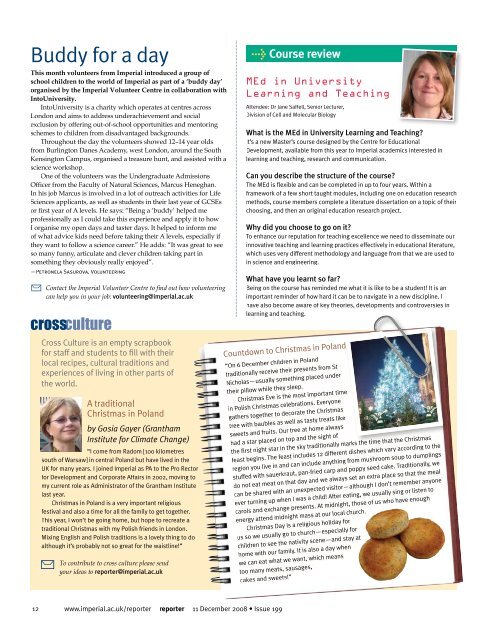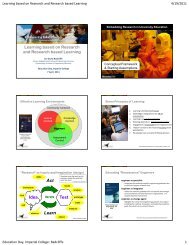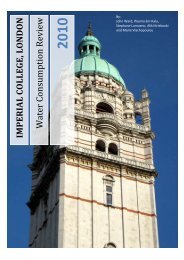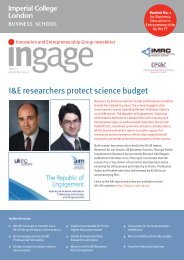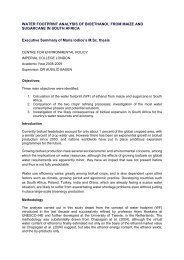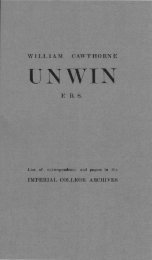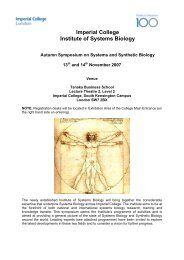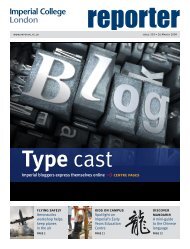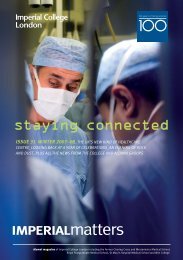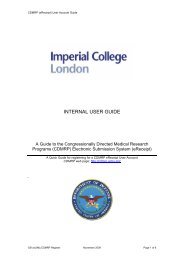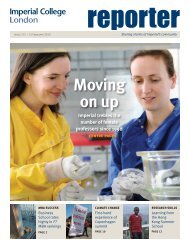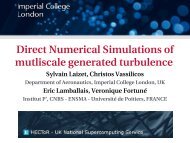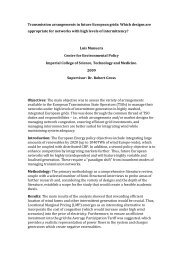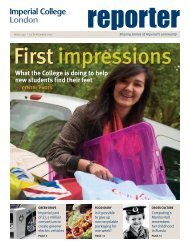199 as pdf - Imperial College London
199 as pdf - Imperial College London
199 as pdf - Imperial College London
Create successful ePaper yourself
Turn your PDF publications into a flip-book with our unique Google optimized e-Paper software.
Buddy for a day<br />
This month volunteers from <strong>Imperial</strong> introduced a group of<br />
school children to the world of <strong>Imperial</strong> <strong>as</strong> part of a ‘buddy day’<br />
organised by the <strong>Imperial</strong> Volunteer Centre in collaboration with<br />
IntoUniversity.<br />
IntoUniversity is a charity which operates at centres across<br />
<strong>London</strong> and aims to address underachievement and social<br />
exclusion by offering out-of-school opportunities and mentoring<br />
schemes to children from disadvantaged backgrounds.<br />
Throughout the day the volunteers showed 12–14 year olds<br />
from Burlington Danes Academy, west <strong>London</strong>, around the South<br />
Kensington Campus, organised a tre<strong>as</strong>ure hunt, and <strong>as</strong>sisted with a<br />
science workshop.<br />
One of the volunteers w<strong>as</strong> the Undergraduate Admissions<br />
Officer from the Faculty of Natural Sciences, Marcus Heneghan.<br />
In his job Marcus is involved in a lot of outreach activities for Life<br />
Sciences applicants, <strong>as</strong> well <strong>as</strong> students in their l<strong>as</strong>t year of GCSEs<br />
or first year of A levels. He says: “Being a ‘buddy’ helped me<br />
professionally <strong>as</strong> I could take this experience and apply it to how<br />
I organise my open days and t<strong>as</strong>ter days. It helped to inform me<br />
of what advice kids need before taking their A levels, especially if<br />
they want to follow a science career.” He adds: “It w<strong>as</strong> great to see<br />
so many funny, articulate and clever children taking part in<br />
something they obviously really enjoyed”.<br />
—Petronela S<strong>as</strong>urova, Volunteering<br />
Contact the <strong>Imperial</strong> Volunteer Centre to find out how volunteering<br />
can help you in your job: volunteering@imperial.ac.uk<br />
crossculture<br />
Cross Culture is an empty scrapbook<br />
for staff and students to fill with their<br />
local recipes, cultural traditions and<br />
experiences of living in other parts of<br />
the world.<br />
A traditional<br />
Christm<strong>as</strong> in Poland<br />
by Gosia Gayer (Grantham<br />
Institute for Climate Change)<br />
“I come from Radom [100 kilometres<br />
south of Warsaw] in central Poland but have lived in the<br />
UK for many years. I joined <strong>Imperial</strong> <strong>as</strong> PA to the Pro Rector<br />
for Development and Corporate Affairs in 2002, moving to<br />
my current role <strong>as</strong> Administrator of the Grantham Institute<br />
l<strong>as</strong>t year.<br />
Christm<strong>as</strong> in Poland is a very important religious<br />
festival and also a time for all the family to get together.<br />
This year, I won’t be going home, but hope to recreate a<br />
traditional Christm<strong>as</strong> with my Polish friends in <strong>London</strong>.<br />
Mixing English and Polish traditions is a lovely thing to do<br />
although it’s probably not so great for the waistline!”<br />
To contribute to cross culture ple<strong>as</strong>e send<br />
your ide<strong>as</strong> to reporter@imperial.ac.uk<br />
> Course review<br />
MEd in University<br />
Learning and Teaching<br />
Attendee: Dr Jane Saffell, Senior Lecturer,<br />
Division of Cell and Molecular Biology<br />
What is the MEd in University Learning and Teaching?<br />
It’s a new M<strong>as</strong>ter’s course designed by the Centre for Educational<br />
Development, available from this year to <strong>Imperial</strong> academics interested in<br />
learning and teaching, research and communication.<br />
Can you describe the structure of the course?<br />
The MEd is flexible and can be completed in up to four years. Within a<br />
framework of a few short taught modules, including one on education research<br />
methods, course members complete a literature dissertation on a topic of their<br />
choosing, and then an original education research project.<br />
Why did you choose to go on it?<br />
To enhance our reputation for teaching excellence we need to disseminate our<br />
innovative teaching and learning practices effectively in educational literature,<br />
which uses very different methodology and language from that we are used to<br />
in science and engineering.<br />
What have you learnt so far?<br />
Being on the course h<strong>as</strong> reminded me what it is like to be a student! It is an<br />
important reminder of how hard it can be to navigate in a new discipline. I<br />
have also become aware of key theories, developments and controversies in<br />
learning and teaching.<br />
Countdown to Christm<strong>as</strong> in Poland<br />
“On 6 December children in Poland<br />
traditionally receive their presents from St<br />
Nichol<strong>as</strong>—usually something placed under<br />
their pillow while they sleep.<br />
Christm<strong>as</strong> Eve is the most important time<br />
in Polish Christm<strong>as</strong> celebrations. Everyone<br />
gathers together to decorate the Christm<strong>as</strong><br />
tree with baubles <strong>as</strong> well <strong>as</strong> t<strong>as</strong>ty treats like<br />
sweets and fruits. Our tree at home always<br />
had a star placed on top and the sight of<br />
the first night star in the sky traditionally marks the time that the Christm<strong>as</strong><br />
fe<strong>as</strong>t begins. The fe<strong>as</strong>t includes 12 different dishes which vary according to the<br />
region you live in and can include anything from mushroom soup to dumplings<br />
stuffed with sauerkraut, pan-fried carp and poppy seed cake. Traditionally, we<br />
do not eat meat on that day and we always set an extra place so that the meal<br />
can be shared with an unexpected visitor—although I don’t remember anyone<br />
ever turning up when I w<strong>as</strong> a child! After eating, we usually sing or listen to<br />
carols and exchange presents. At midnight, those of us who have enough<br />
energy attend midnight m<strong>as</strong>s at our local church.<br />
Christm<strong>as</strong> Day is a religious holiday for<br />
us so we usually go to church—especially for<br />
children to see the nativity scene—and stay at<br />
home with our family. It is also a day when<br />
we can eat what we want, which means<br />
too many meats, sausages,<br />
cakes and sweets!”<br />
12 www.imperial.ac.uk/reporter reporter<br />
11 December 2008 • Issue <strong>199</strong>


